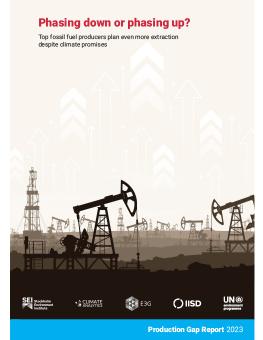
The Production Gap
Phasing Down or Phasing Up? Top fossil fuel producers plan even more extraction despite climate promises
The report measures the misalignment between governments' planned production of coal, oil, and gas and the global production levels consistent with meeting the Paris Agreement temperature goals. The 2023 Production Gap Report finds that governments plan to produce around 110% more fossil fuels in 2030 than the 1.5°C temperature limit allows.
-
Governments plan to produce more fossil fuels in 2030 than would be consistent 1.5°C. With increasing coal, oil, and gas production the fossil fuel #ProductionGap is expected to grow over time.
-
Governments plan to produce more than double the amount of #FossilFuels than is consistent with the Paris Agreement. To limit warming to 1.5°C, governments must close the #ProductionGap.
-
The #ProductionGap Report finds that governments' production plans and projections would lead to 460% more coal, 29% more oil, and 82% more gas in 2030 than would be consistent with limiting global warming to 1.5°C.
The 2023 Production Gap Report: Phasing down or phasing up? Top fossil fuel producers plan even more extraction despite climate promises tracks the gap between governments' planned and projected global fossil fuel production and the amount that would be consistent with the Paris Agreement. In this fourth edition, the report finds that governments plan to produce more than double the fossil fuels in 2030 than would be consistent with limiting warming to 1.5°C.
The report's main findings include:
- Governments, in aggregate, still plan to produce more than double the amount of fossil fuels in 2030 than would be consistent with limiting warming to 1.5°C. The persistence of the global production gap puts a well-managed and equitable energy transition at risk.
- Taken together, government plans and projections would lead to an increase in global coal production until 2030 and in global oil and gas production until at least 2050. This conflicts with government commitments under the Paris Agreement and clashes with expectations that global demand for coal, oil, and gas will peak within this decade, even without new policies.
- Major producer countries have pledged to achieve net-zero emissions and launched initiatives to reduce emissions from fossil fuel production, but none have committed to reducing coal, oil, and gas production in line with limiting warming to 1.5°C.
- Governments should be more transparent in their plans, projections, and support for fossil fuel production and how they align with national and international climate goals.
- There is a strong need for governments to adopt near- and long-term reduction targets in fossil fuel production and use to complement other climate mitigation targets and to reduce the risks of stranded assets.
- Given the risks and uncertainties of carbon capture and storage and carbon dioxide removal, countries should aim for a near total phase-out of coal production and use by 2040 and a combined reduction in oil and gas production and use by three-quarters by 2050 from 2020 levels, at a minimum. The potential failure of these measures to develop at scale calls for an even more rapid global phase-out of all fossil fuels.
- An equitable transition away from fossil fuel production must recognize countries' differentiated responsibilities and capabilities. Governments with greater transition capacity should aim for more ambitious reductions and help finance the transition processes in countries with limited capacities.
The 2023 Production Gap Report is produced by the Stockholm Environment Institute, Climate Analytics, E3G, the International Institute for Sustainable Development, and the United Nations Environment Programme (UNEP). More than 80 researchers contributed to the analysis and review, spanning numerous universities, think tanks, and other research organizations.
You might also be interested in
January 2025 | Carbon Minefields Oil and Gas Exploration Monitor
Last month, a total of 78 oil and gas exploration licences were awarded in two countries. The United States had the largest volume of embodied emissions in the licences it awarded.
December 2024 | Carbon Minefields Oil and Gas Exploration Monitor
In November 2024, 23 oil and gas exploration licences were awarded across five countries, with Russia granting the licences that account for the largest portion of embodied emissions.
Fossil Fuel Production, Renewable Energy, and Subsidy Reform in Nationally Determined Contributions 3.0
This policy brief provides an analysis of the critical benchmarks and recommendations necessary for aligning nationally determined contributions (NDCs) with the 1.5 °C target.
An OECD Deal on Ending Oil and Gas Export Credits Is Urgently Needed. Here’s What it Could Look Like.
The European Union, the United Kingdom, and Canada have introduced a proposal to end oil and gas financing by export credit agencies at the OECD. Pressure is building to reach a deal by the end of 2024.